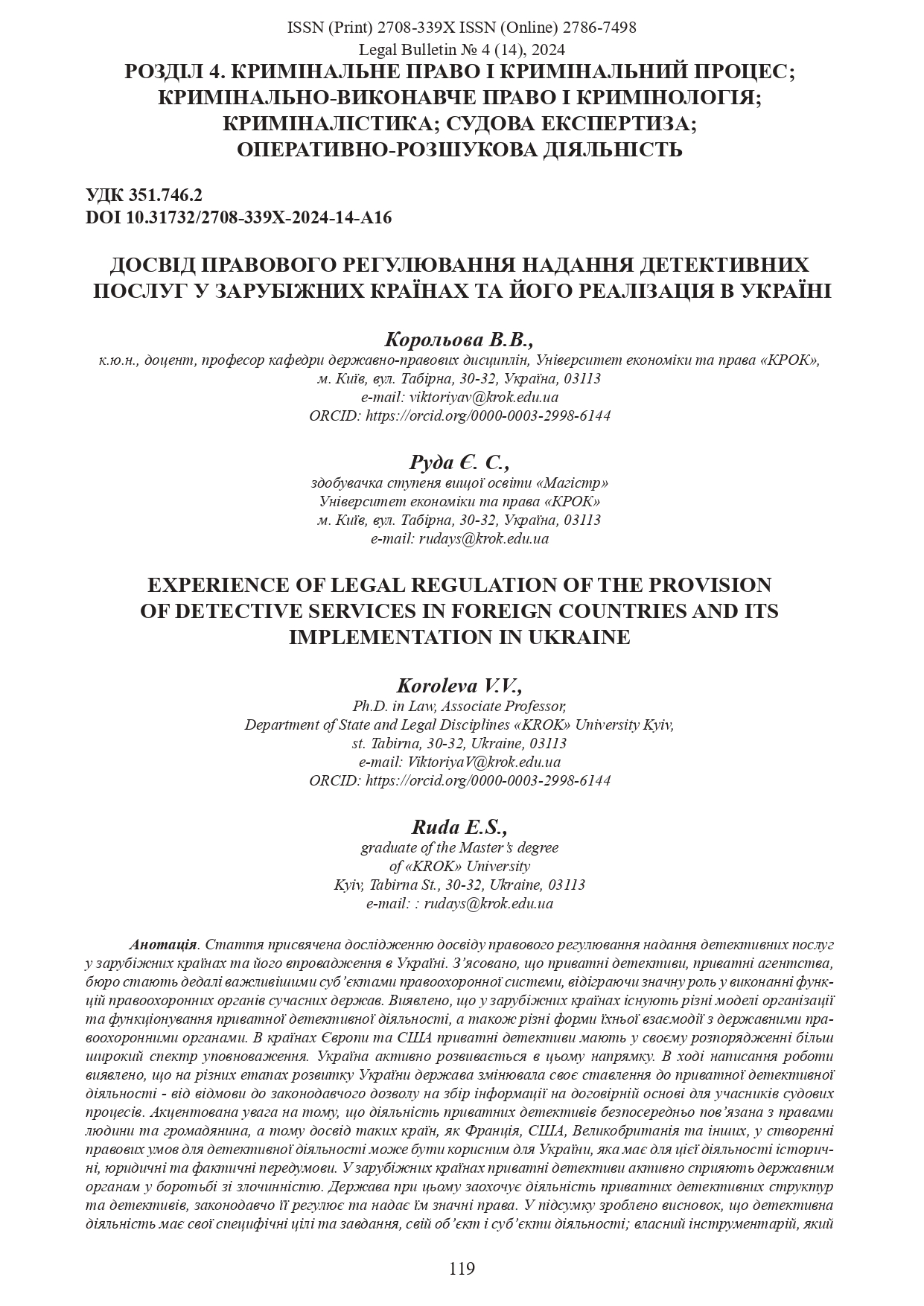EXPERIENCE OF LEGAL REGULATION OF THE PROVISION OF DETECTIVE SERVICES IN FOREIGN COUNTRIES AND ITS IMPLEMENTATION IN UKRAINE
DOI:
https://doi.org/10.31732/2708-339X-2024-14-A16Keywords:
: detective services, private detective, contract, license, qualification of a private detectiveAbstract
The article is devoted to the study of the experience of legal regulation of the provision of detective services in foreign countries and its implementation in Ukraine. It was found that private detectives, private agencies, bureaus are becoming increasingly important subjects of the law enforcement system, playing a significant role in the performance of the functions of law enforcement bodies of modern states. It was found that in foreign countries there are different models of organization and functioning of private detective activities, as well as different forms of their interaction with state law enforcement bodies. In European countries and the USA, private detectives have a wider range of powers at their disposal. Ukraine is actively developing in this direction. In the course of writing the work, it was revealed that at different stages of the development of Ukraine, the state changed its attitude towards private detective activities - from refusal to legislative permission to collect information on a contractual basis for participants in legal proceedings. The emphasis is on the fact that the activities of private detectives are directly related to human and civil rights, and therefore the experience of such countries as France, the USA, Great Britain and others in creating legal conditions for detective activities can be useful for Ukraine, which has historical, legal and factual prerequisites for this activity. In foreign countries, private detectives actively assist state bodies in the fight against crime. At the same time, the state encourages the activities of private detective structures and detectives, regulates them by law and grants them significant rights. As a result, the conclusion is made that detective activities have their own specific goals and objectives, their own object and subjects of activity; their own tools that will make detective work as effective and independent as possible. In this regard, it is important for Ukraine to take into account the experience of leading countries in the legal regulation of detective activities.
References
Черков В. О., Попов П. О. Приватна детективна діяльність у розвинутих країнах світу. Вісник Луганського державного університету внутрішніх справ імені Е. О. Дідоренка. 2010. Вип. 2. С. 248-259.
Волинська А. М. Надання детективних послуг за законодавством зарубіжних країн: позитивний досвід цивільно-правового регулювання. Науковий вісник Ужгородського національного університету. Серія : Право. 2016. Вип. 39(1). С. 41-46.
Француз. А.Й., Істоміна А.С. Приватна детективна діяльність: міжнародний досвід та національні перспективи. Legal Bulletin. 2022. С. 81-90.
Вінгловська, О. І. Шляхи імплементації кращого зарубіжного досвіду у сфері регулювання діяльності інституту приватних детективів. Проблеми сучасних трансформацій. Серія: право, публічне управління та адміністрування, № 10. 2023. URL: https://doi.org/10.54929/2786-5746-2023-10-01-11. (Accessed October 29,2024)
Бугайчук К.Л. Інститут приватних детективів за кордоном: порівняльно-правовий аналіз. Право і безпека. 2016. № 1 (60). С. 7-13.
Корольова В.В., Ніколенко Б.С. Деякі цивільно-правові аспекти щодо надання детективних послуг. Legal Bulletin. №11. 2024. 57-63.
Лесько Н. В. Організаційно-правові засади діяльності приватних детективів у Польщі та Україні. Вчені записки Таврійського національного університету імені В. І. Вернадського. Серія : Юридичні науки. 2023. Т. 34(73). № 2. С. 252-257.
Даниленко С. К. Поняття, зміст детективних послуг та перспективи їх розвитку в Україні. Південноукраїнський правничий часопис. 2015. № 3. С. 84-86.
Курта Є. О., Поливанюк В. Д. Види приватних детективних послуг, що можуть надаватись в Україні: перспективи правового регулювання з урахуванням міжнародного досвіду. Науковий вісник Дніпропетровського державного університету внутрішніх справ. 2016. № 4. С. 229-235.






